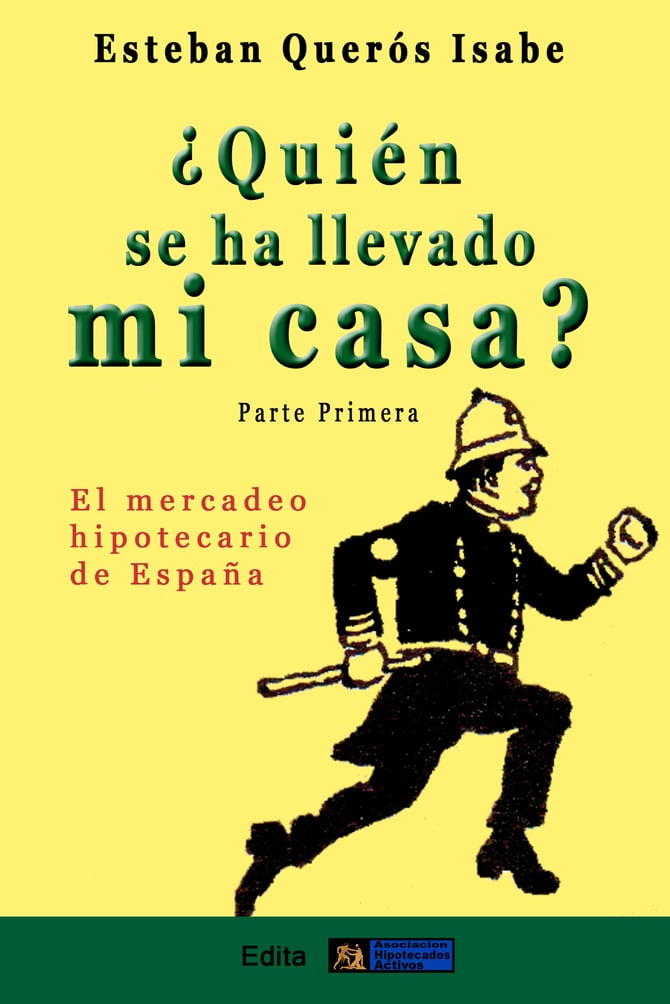¿QUIEN SE HA LLEVADO MI CASA? El mercadeo hipotecario en España
Estimado lector:
Si usted tiene un préstamo hipotecario con una entidad financiera española, es muy probable que dicha entidad esté negociando con su préstamo hipotecario. Es lo que se conoce como el "MERCADO HIPOTECARIO"......
Me dirá que es imposible, que la propiedad está inscrita a su nombre y que el acreedor es el banco.... ¿Y si le digo que hay otros registros especiales y libros contables que registran la transmisión o afectación de una garantía hipotecaria? ¿Y si le digo que hay un mercado secundario en el que su préstamo hipotecario pasa de mano en mano y puede que esté en manos del Banco Central Europeo? ¿Y si le digo que se olvide de la escritura pública porque su préstamo viaja en un título valor?
Efectivamente esto no es un "Mercado Hipotecario", es un "MERCADEO HIPOTECARIO".
¿Había usted leído alguna vez que una entidad financiera tiene prohibido reestructurar deudas sin el consentimiento del "sindicato de bonistas" (suena un poco mafiosillo) o del "cedulista" o el "partícipe" hipotecario? Se puede decir que el legislador español y el gobierno prohiben de facto reestructurar deudas de particulares.
Por legislar, en los últimos años se ha legislado hasta el "padrenuestro". Ya no se perdonan las deudas (como nosotros perdonamos a nuestros deudores), sino las "ofensas" (como perdonamos a los que nos ofenden).
Este libro expone muchas de las contradicciones que tiene la actual normativa del mercado hipotecario. Sin duda muchas de estas contradicciones le proporcionarán una visión muy especial del tinglado que hay montado en torno a una Ley bastante desconocida como es la Ley 2/1981 Reguladora del Mercado Hipotecario, que no hay que confundir con la "Ley Hipotecaria".
Este libro también entra en el análisis del uso del lenguaje. Existen conceptos que son utilizados coloquialmente de forma que inducen a error. El ejemplo más notable es el del "avalista" de una hipoteca, que no lo es tal, sino que es un "fiador solidario" que además pacta "voluntariamente" la renuncia del "beneficio de excusión".
------------------------------------
We are considering to prepare an English Version by June 2016. If you are interested, please leave your comment in the web page.
WHO MOVED MY HOME?
Dear reader:
If you have signed a mortgage loan with a Spanish Credit Institution, it is likely that the Bank or the Savings Bank is trading with your mortgage loan.
You would say that it is impossible, that the Property is registered in your name and that the creditor is the bank and that you have a public deed... What would you say if I tell you that there are "special books" and "special accounting records" outside the Property Register which record the transfer or allocation of a mortgage? Do you know that there is a secondary market in which your home mortgage loan "moves" from hand to hand and right now your creditor may be the European Central Bank? You must forget about the "public deed" for your mortgage loan because your loan is being moved from one hand to other in the form of "security".
Sure enough, the currenty system is not a "Mortgage Market" (Mercado Hipotecario), but a "Mortgage Bargaining" (Mercadeo Hipotecario).
Have you ever heard about that it is forbidden for a Credit Institution to restructure debt without the consent of the "syndicate of bondholders" (sounds like "mafia") or the "cedulista" or the "partícipe" of the loan mortgage? It can be said that the Spanish Legislator and the Spanish Goverments have forbidden to restructure private debts. Even Spanish version of "Our Father" prayer has been changed in recent years to reflect this move. No more "forgive our debts as we forgive our debtors", but "forgive affronts as we forgive those who trespass against us".
This book exposes many of the contradictions of the current mortgage market regulations. No doubt many of these contradictions will provide a very special view of the shed that is mounted around a fairly unknown "Law 2/1981 "Regulating the Mortgage Market", which should not be confused with the "Mortgage Law".
This book also goes into the analysis of languaje use. There are concepts that are used colloquially in a misleading manner. The most notable example is the so-called "guarantor-avalista" of a mortgage loan who should have limited liability but instead is nothing but a "guarantor-fiador solidario" that has unlimited liabilities and that voluntarily agrees to waive his benefit of excusion.

 Cart
Cart  Checkout
Checkout